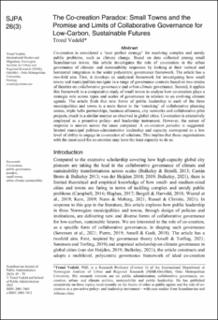| dc.contributor.author | Vedeld, Trond | |
| dc.date.accessioned | 2023-02-15T12:40:57Z | |
| dc.date.available | 2023-02-15T12:40:57Z | |
| dc.date.created | 2022-09-22T14:05:32Z | |
| dc.date.issued | 2022 | |
| dc.identifier.citation | Scandinavian Journal of Public Administration. 2022, 26 (3), 45-70. | en_US |
| dc.identifier.issn | 2001-7405 | |
| dc.identifier.uri | https://hdl.handle.net/11250/3051127 | |
| dc.description.abstract | Co-creation is considered a ‘near perfect strategy’ for resolving complex and unruly public problems, such as climate change. Based on data collected among small Scandinavian towns, this article investigates the role of co-creation in the urban governance of climate- and sustainability responses by looking at their vertical and horizontal integration in the wider polycentric governance framework. The article has a two-fold aim. First, it develops an analytical framework for investigating how small towns and municipalities navigate in a range of governance contexts based on two strains of theories on collaborative governance and urban climate governance. Second, it applies this framework to a comparative study of small towns to analyse how co-creation plays a strategic role across types and scales of governance in relation to an evolving climate agenda. The article finds that new forms of public leadership in each of the three municipalities and towns is a main factor in the ‘remaking’ of collaborative planning arenas, triple helix partnerships, business alliances, city networks and collaborative pilot projects, much in a similar manner as observed in global cities. Co-creation is extensively employed as a proactive policy- and leadership instrument. However, the nature of response is uneven across the cases compared. A co-creation paradox is suggested: limited municipal politico-administrative leadership and capacity correspond to a low level of ability to engage in co-creation of solutions. This implies that those organisations with the most need for co-creation may have the least capacity to do so. | en_US |
| dc.description.abstract | The Co-creation paradox: Small towns and the promise and limits of collaborative governance for low-carbon, sustainable futures | en_US |
| dc.language.iso | eng | en_US |
| dc.relation.uri | https://ojs.ub.gu.se/index.php/sjpa/article/view/5356/4177 | |
| dc.rights | Attribution-NonCommercial-NoDerivatives 4.0 Internasjonal | * |
| dc.rights.uri | http://creativecommons.org/licenses/by-nc-nd/4.0/deed.no | * |
| dc.title | The Co-creation paradox: Small towns and the promise and limits of collaborative governance for low-carbon, sustainable futures | en_US |
| dc.type | Peer reviewed | en_US |
| dc.type | Journal article | en_US |
| dc.description.version | publishedVersion | en_US |
| cristin.ispublished | true | |
| cristin.fulltext | original | |
| cristin.qualitycode | 1 | |
| dc.identifier.cristin | 2054394 | |
| dc.source.journal | Scandinavian Journal of Public Administration | en_US |
| dc.source.volume | 26 | en_US |
| dc.source.issue | 3 | en_US |
| dc.source.pagenumber | 45-70 | en_US |
| dc.relation.project | Norges forskningsråd: 576644 | en_US |

